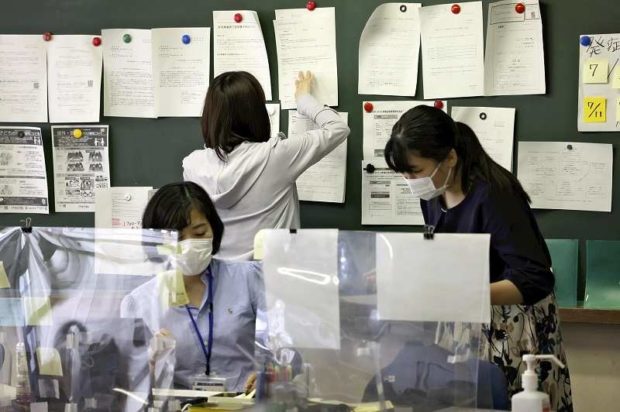Japan shifts to ‘living with coronavirus’ strategy

Public health center staff are seen working at a facility in Edogawa Ward, Tokyo, on July 14. The Japan News/Asia News Network
TOKYO — The mandatory reporting of coronavirus cases might be scrapped to ease the burden on public health centers, medical institutions, and the public under a review of the pandemic situation planned by the Japanese government.
The move is believed to be based on a shift in the government’s strategy toward living with COVID-19. But due to the possibility of the emergence of new variants, the government is expected to conduct the review through flexible applications of the Infectious Diseases Law, rather than legal revisions.
“The virus has modified over time, so the classification under the law should also be modified,” Tottori Gov. Shinji Hirai said at a press conference in Nara on Friday, following a meeting of the National Governors’ Association, which he heads.
An emergency proposal compiled at the meeting, calls for the government to “review the handling of COVID-19 under the Infectious Diseases Law — including whether all cases need to be identified — and present a roadmap for the process as soon as possible.”
About 39,000 medical facilities handle consultations with coronavirus patients, about half of the number of facilities that specialize in internal medicine. The facilities are obliged to notify public health centers of all coronavirus cases and the health centers are responsible for checking up on the condition of patients.
Article continues after this advertisementHowever, as there is a low rate of severe illness associated with the currently prevalent omicron variant, there is a view within the government and among experts that the effectiveness of measures such as comprehensive case tallies is waning in relation to the excessive burden it puts on medical facilities.
Article continues after this advertisementUnlike diseases classified under the government’s five-tier categorization of infectious diseases, for which the necessary measures are strictly defined, COVID-19 has been treated as a disease equivalent to Category II and has been dealt with flexibly through the application of relevant legislation. Category I comprises the most dangerous diseases, and Category V, the least severe.
Since the sixth wave in January, the government and local governments have been gradually moving their response to the pandemic closer to that of Category V.
Kanagawa Prefecture no longer insists on the identification of all infected people. Since January, the prefectural government has been issuing advice for people aged 2-64 who test positive with home testing kits to recuperate at home instead of visiting an outpatient fever clinic, due to the low risk of serious illness.
Although such people are not included in the prefecture’s coronavirus tally, they can receive medical certificates that can be submitted to their workplaces and are entitled to receive care services from public health centers.
Contact tracing
The government is also calling for contact tracing to be carried out only at elderly care centers and other such facilities.
Meanwhile, the Tokyo metropolitan government and the Chiba prefectural government have stopped contact tracing at day nurseries, to avoid a situation in which parents who drop off their children are forced to take time off work due to self-isolation advice.
The government intends to review the situation after the seventh wave of the pandemic has been contained, and is expected to change the application of the Infectious Diseases Law, rather than revise legislation.
The response is likely to involve altering government and ministerial ordinances and changing notifications issued by the Health, Labor, and Welfare Ministry, which would allow for a quick response in the event of a new, higher-risk variant emerging.
RELATED STORIES
Japan logs all-time high COVID-19 cases
Japan marks most weekly new COVID-19 infections globally with 970,000 cases
For more news about the novel coronavirus click here.
What you need to know about Coronavirus.
For more information on COVID-19, call the DOH Hotline: (02) 86517800 local 1149/1150.
The Inquirer Foundation supports our healthcare frontliners and is still accepting cash donations to be deposited at Banco de Oro (BDO) current account #007960018860 or donate through PayMaya using this link.